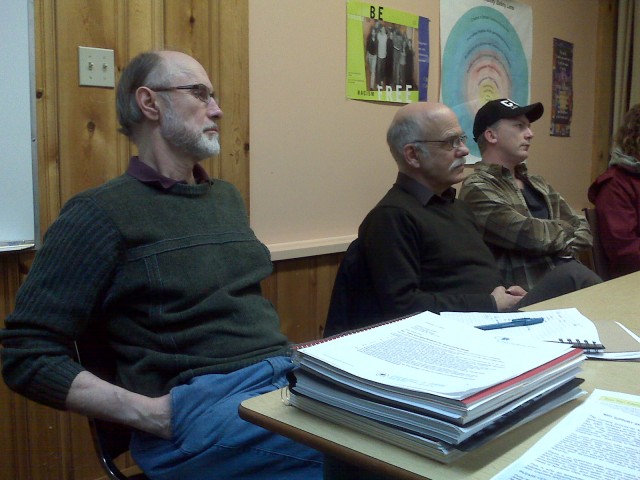Atamanenko spends time with constituents
Taking advantage of the prorogued Parliament, MP Alex Atamanenko spent some time in Grand Forks meeting with constituents. During the day on Jan. 14, Atamanenko met with community members at the Grand Forks Public Library in open sessions. In separate meetings, he spent time with both the agriculture society and the medical marijuana support group.
The Grand Forks and Boundary Regional Agricultural Society (GFBRAS) met with Atamanenko at Selkirk College to discuss the abattoir project. Over 18 people were present to express concerns over the slow progress on the project and the roadblocks to moving the abattoir forward. GFBRAS has been working with the B.C. Meat Industry Enhancement Strategy contractors to create a mobile abattoir for the region that will be able to process multiple species of animals and poultry. The design is a new one for the province. Also present at the meeting was Abra Brynne, a contractor with the B.C. Food Processors Association (BCFPA) who is a regional support person for GFBRAS in this project.
“I’ve learned a lot today,” said Atamanenko. “I want to thank all of you for your hard work with Doug (Zorn) on a number of issues facing agriculture in this area.”
Atamanenko heard the groups frustration over the ongoing difficulties in working with the B.C. Centre for Disease Control and the Canadian Food Inspection Agency. He also was able to follow up with the federal government’s Community Adjustment funding program where GFBRAS had submitted a proposal for funding to complete the project. While the project has not been chosen for funding, it is still in the running but Atamanenko was unable to determine a final date when the organization will know one way or another.
GFBRAS already has a $100,000 commitment in funding for the abattoir from the BCFPA and will need to match that funding in order to build their mobile unit. Basic approval from the BCCDC has been received, but a number of modifications are still required before the unit can be built. Community Futures Boundary has also committed $10,000 for GFBRAS to get detailed engineered plans developed for the abattoir’s next step prior to actual building of the unit.
Atamanenko also spent time with Grand Forks medical marijuana support group. Members shared their stories of the challenges of their diseases such as cancer with Atamanenko, and their frustrations with unsuccessful prescription medications to treat their symptoms and conditions. Some members were licensed as Health Canada medical marijuana licensees, some were family members of medical marijuana users and some were concerned citizens.
“The use of medical marijuana is legal, but unfortunately access is often denied,” said Atamanenko. “The licensing process can be onerous to a sick person, much more so than obtaining a normal prescription.”
“At our meeting, I listened to some gut-wrenching stories of people suffering from various illnesses who have had difficulty in obtaining medical marijuana. This should not be the case. The social stigma of marijuana should not create barriers to prevent patients from obtaining necessary treatments to alleviate suffering.”
The support group assists patients to complete Health Canada applications to obtain medical marijuana licenses, with their doctor’s approval. Marijuana has been shown to bring relief for some chronic conditions like Multiple Sclerosis and helpful in pain maintenance for cancer patients, for example. The support group also provides a safe, compassionate space to converse with other medical marijuana users and supporters and gain education on the medicinal plant and its health applications.
The group is petitioning government leaders to promote the goal of the B.C. government assuming the regulation and licensing of medical marijuana under the Ministry of Health. The use of marijuana as a medicine has been legal since 2001, and the group believes it should be treated in a similar way to other prescription drugs.






















